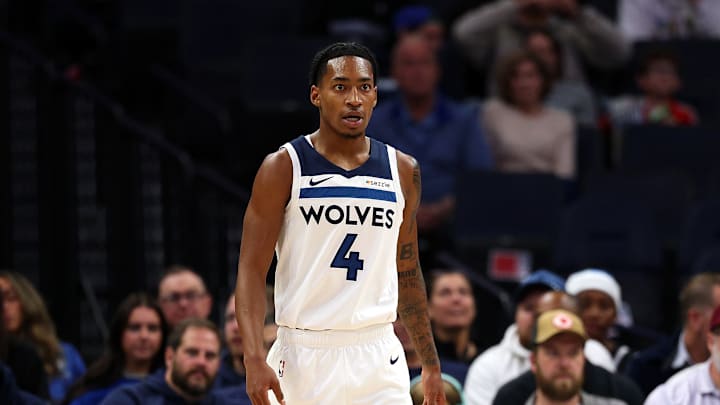Many people (myself included) were expecting second-year guard Rob Dillingham to have a breakout season. This is especially true given the Minnesota Timberwolves' lack of point guard play, with all due respect to Mike Conley.
However, thus far, Dillingham's role has looked fairly similar to his rookie season. Dillingham is averaging 11.2 minutes (.7 more than last year), 4.7 points, 2.1 assists, and 1.3 rebounds on 37.3/20/72.7 shooting splits.
The main concerns Dillingham doubters had with him getting a bigger role were defense and decision-making. Shockingly, though, it's been his shot-making that has prevented Chris Finch from unleashing Dillingham.
As a prospect, Dillingham's main selling point was his scoring and self-creation ability. This skill set made the Wolves trade two future first-round picks to draft him in the lottery in 2024. The strange thing is, despite concerns about Dillingham's defense and decision-making, he's been fairly solid in this regard; it's truly been his scoring that held him back.
Dillingham's all-around game has been fairly impressive
Dillingham is listed at 6-foot-1, 175 pounds per Basketball Reference. As a result, defense has always been the chief concern with Rob. However, per Cleaning the Glass, the Wolves' defense has been better with Dillingham on the court. Notably, the Wolves have a 108.9 DRTG with him on the court, and they have a 114.4 DRTG without him.
He'll always be targeted defensively given his size. Regardless, per Databallr, Dillingham ranks in the 97th percentile for deflections per 100 possessions and the 91st percentile for steals per 100 possessions. Dillingham's lateral quickness and reaction time help him compete on defense.
Rob Dillingham PnR steal + transition pass to Naz Reid for the layup pic.twitter.com/nweG8k56wQ
— Timberwolves Clips (@WolvesClips) November 20, 2025
Chalk it up to Dillingham playing more with Rudy Gobert if you want. But it's clear the Wolves can have a high-level defense with Dillingham on the court. Likewise, his 48.2 defensive field goal percentage is passable, albeit not great. This does include an impressive 23.5 DFG% on 3-pointers.
On the other side of the ball, Dillingham has mostly made the right reads. A 1.69 assist-to-turnover ratio isn't anything to write home about. However, watching the games, Dillingham hasn't made a lot of mistakes as a playmaker; he is averaging 4.0 potential assists despite averaging 2.1 assists overall.
Dillingham's subpar scoring and efficiency are concerning
Ok, let's get back to the crux of things, scoring, which is, in theory, his bread and butter. Back at Kentucky, Dillingham averaged 15.2 points on 44 percent shooting from deep range. However, through his 62 total NBA games, he is shooting just 42.4 percent from the field and 31.5 percent from 3-point land.
Dillingham flashed his immense scoring upside last year. In the final 20 games last season, he shot just 37 percent from the field and 13.3 percent from 3-point range. Unfortunately, this trend has continued, as noted earlier, he is shooting 37.3 percent from the field and 20 percent from beyond the arc.
Remember when I said the Wolves' defense was actually better with Dillingham on the court? While the offense is much better with Dillingham off the court. Minnesota posts a 124.4 offensive rating (93rd percentile) with Dillingham off the court and a 104.1 ORTG with him on the court (4th percentile).
Wednesday's game against the Washington Wizards highlighted Dillingham's scoring issues. He shot 1-6 from the field, and in the fourth quarter, the Wizards sagged off him, yet he failed to make them pay for this.
Honestly, Dillingham looks like he's lost some confidence as a scorer, despite being able to contribute in other areas. He can still attack the rim with his blazing speed, but has struggled to finish at the rim, shooting just 34.5 percent at the rim. As an outside shooter, he is extremely hesitant.
Some of Rob Dillingham's offensive struggles are epitomized in this possession.
— Jonah (@Huncho_Jman) November 18, 2025
Does a good job at attacking the Marshall closeout, but then is stuck between decisions.
Gets a second chance on the OREB swing, but hesitates to shoot, awkward dribble to then reset to Ant. pic.twitter.com/BXRfXZQb9b
Many Wolves fans (myself included) have advocated for him to have a longer leash. Nevertheless, when you're an undersized guard and struggling to score, it's hard to justify getting more minutes, especially as the Wolves have title aspirations. And to be fair to Finch, he gave Dillingham meaningful fourth quarter minutes against the Wizards.
While it's easy to panic over Dillingham's slow start as a scorer, the glass-half-full side could argue that if he can find some momentum as a scorer, he could be a true mainstay of the rotation.
Ultimately, I still believe that Dillingham would find his groove in a more consistent role, but giving him that role is challenging given the Wolves' championship aspirations.
